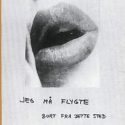Grete Roulund studied film and began to write when her then husband went bankrupt. It was only with enormous difficulty that she managed to get her first short story collection, Verdito, 1981, accepted, but the following year she was successful with the critically acclaimed novel Blackhawk, about two men and their battle against time and rabies in the Canadian wilderness. Her hard-hitting style led critics to wonder at her nationality and gender.
Efter år nul, 1983, is a science fiction novel about the aftermath of the disaster that was always present in her works. Her novels couple culture clash and cultural criticism with the image of men’s awkward relationship with the body and women, such as in Emeralde Verde (N), 1992, about the political and sexual agony of an officer during a conflict on a multiethnic holiday island, and in Dr. Zarkowskis eksperiment (N), 1993, in which the roots of evil are traced back to World War II. In 1995, she published Setans porte (N), which takes place on the fictitious tropical island of Sawa. Men vi mødes her og andre historier (SS), 1997, continued the theme of world war and concentration camps. Grete Roulund also wrote dramas, including, Skår, 1995.
Additions by the editorial team 2011:
The above biography was first published in 1998. Since then, Grete Roulund published five novels: Silberknabe, 1998, Kvinden fra Sáez, 2000, Madeshi, 2001, Professor Sterns kontor, 2002, and Baga Road, 2003. She also published several short story collections, including Stedfortræderen, 1999.


